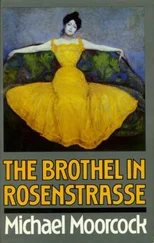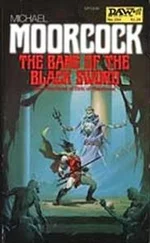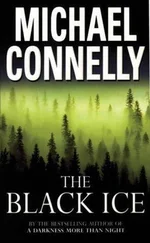Michael Moorcock - The Black Corridor
Здесь есть возможность читать онлайн «Michael Moorcock - The Black Corridor» весь текст электронной книги совершенно бесплатно (целиком полную версию без сокращений). В некоторых случаях можно слушать аудио, скачать через торрент в формате fb2 и присутствует краткое содержание. Жанр: Фантастика и фэнтези, на английском языке. Описание произведения, (предисловие) а так же отзывы посетителей доступны на портале библиотеки ЛибКат.
- Название:The Black Corridor
- Автор:
- Жанр:
- Год:неизвестен
- ISBN:нет данных
- Рейтинг книги:3 / 5. Голосов: 1
-
Избранное:Добавить в избранное
- Отзывы:
-
Ваша оценка:
- 60
- 1
- 2
- 3
- 4
- 5
The Black Corridor: краткое содержание, описание и аннотация
Предлагаем к чтению аннотацию, описание, краткое содержание или предисловие (зависит от того, что написал сам автор книги «The Black Corridor»). Если вы не нашли необходимую информацию о книге — напишите в комментариях, мы постараемся отыскать её.
The Black Corridor — читать онлайн бесплатно полную книгу (весь текст) целиком
Ниже представлен текст книги, разбитый по страницам. Система сохранения места последней прочитанной страницы, позволяет с удобством читать онлайн бесплатно книгу «The Black Corridor», без необходимости каждый раз заново искать на чём Вы остановились. Поставьте закладку, и сможете в любой момент перейти на страницу, на которой закончили чтение.
Интервал:
Закладка:
Just like a bloody Welshman to hang on and on, not letting you know the facts, creeping about, getting good money out of you, not letting you know that his very presence was threatening to ruin your business. Trying to make himself indispensible in the hopes that you'd never find out about him and fire him. Pleasant and agreeable and co-operative. Maybe even a front for some sort of Welsh Nationalist sabotage. Then—the knife in the back, the bullet from the window, the enemy in the alley.
Stop it, Ryan told himself. Powell wasn't like that. He didn't need to build the man up into a villain to justify sacking him. There was only one reason for sacking him. He was an embarrassment.
He could harm the firm.
Ryan relaxed.
He sat down at his desk, opened a drawer and took out his packed lunch. He opened the thermos flask and poured himself a cup of coffee. He placed his meal on the miniature heater in the lower compartment of the luncheon box.
Thank God, he thought, for the abolition of those communal lunches with other business men, or the firm's executives.
Thank God that communal eating had finally died the death.
What could have been more disgusting than sitting munching and swallowing with a gang of total strangers, sitting there staring at their moving mouths, offering them items—wine, salt, pepper, water—to make their own consumption more palatable, talking to them face to face as they nourished themselves. The conversion of the canteens had provided much-needed office space as well.
Ryan took a fork and dug into the plate. The food was now thoroughly heated.
Once he had eaten he felt even more relaxed. He had thought it all out. He didn't waste time when it came to decisions. No point in moralising.
He wiped his lips.
The problem had assumed its proper proportions. It would cost him a bit in golden and silver handshakes, but it was worth it. He could probably get cheaper staff anyway, considering the huge volume of unemployment, and recoup his losses by the end of the year.
This way everybody gains something. Nobody lost.
He picked up the sheets of names and figures and began to study them closely.
CHAPTER TEN
That's how it was, thinks Ryan. A cop out, now he looked back, but a graceful cop out. No one got badly hurt. It could have been worse. It was the difference between a stupid approach and an intelligent approach to the same problem.
It had been the same when he had got the group out of that riot at the Patriot meeting. When had that been? January. Yes.
January 2000. The civilised world had been expecting the end.
There had been all the usual sort of apocalyptic stuff which Ryan had dismissed as a symptom of radical social change. He had not been able to believe then that things were going to get worse. There had been penitential marches through the streets. Even scourgings, public confessions.
And January had been the month of that oddball move to close the camps for foreigners. The camps had been decently maintained.
The people lived as well as anyone outside the camps—perhaps better in certain circumstances. It had also been the month when the Patriots had tried to open the camps up to more people—to a more sinister, less identifiable group.
Ryan remembers the crowd in Trafalgar Square. A crowd fifty thousand strong, covering the square, pushed up the steps of the National Gallery and St Martin's, pushed inside the Gallery and the Church, right up against the altar. The crowd had blocked the streets all around. It was horrifying. Disgusting. People like rats in a box.
Even now Ryan feels sick, remembering how he felt then.
He and the group had gone along, but they were now regretting it.
Whenever the crowd got too noisy or violent the troops fired over their heads.
It had been snowing. The searchlights played over the plinth where the leading Patriots stood and they flashed over the heads of the crowd, picked up large flakes of snow as they drifted down on the dense mass of people.
The Patriot leaders, collars of their dark coats turned up, stood in the snow looking over the crowd. And as they spoke their voices were enormously amplified. Deafeningly amplified; reaching all the way up the Mall to where Queen Anne sat in her lonely room, hearing the words on TV and from the meeting itself a quarter of a mile away; reaching all the way down Whitehall to Parliament itself.
Parliament. That discredited institution.
They are turning on each other now, thought Ryan, looking at the faces of the Patriots. There were signs of dissension there if he wasn't mistaken. There would be a split soon.
But meanwhile there were the usual speeches, coming distorted into the mind partly because of the amplification system, partly because of the wind, partly because of the usual ungraspable political cliches the speakers used.
The snow kept falling on the upturned faces of the crowd—an orderly crowd of responsible people. There were few interrupters.
The presence of the troops and the paid Patriot Guards made sure of that.
Colin Beesley, Patriot leader and Member of Parliament, stood up to speak.
Beesley, a large, thickset man in a long, black overcoat and a large hat, was an extremist. His political manner was of the old school—the Churchillian school which still touched many people who wanted their politicians to be 'strong'. His tone was ponderous. His words, spoken slowly and relatively clearly, were portentous.
Unlike the others, he did not speak generally about the Patriot cause, for he had come to make a fresh statement.
As he began to speak the wind dropped and his words came through with a sudden clarity—over the crowd in the square, the crowds in the streets, down as far as Westminster, along to Buckingham Palace, as far as Piccadilly Circus in the other direction.
'Aliens among us,' he said, his head lowered and thrust towards the crowd. 'There are aliens among us. We do not know where they come from. We do not know how they landed. We do not know how many there are. But we do know one thing, my friends, people of England—they are among us!'
Ryan, standing uncomfortably in the middle of the crowd in the square grimaced sceptically at his friend Masterson who stood beside him. Ryan couldn't believe in a group of aliens contriving to land on Earth without anyone's knowledge. Not when the skies were scanned for invaders from special observation posts built all over the country. But Masterson was listening seriously and intently to Beesley.
Ryan turned his attention back to the platform.
'We cannot tell who they are, yet they are among us.' Beesley's voice droned on. "They look like us, sound like us—in every respect they are human—but they are not human. They are nonhuman—they are anti-human.' He paused, lowered his voice.
'How, you say, do we know about the aliens? How have we found out about the existence of this pollution, of these creatures who move about our society, like cancer cells in a healthy body? We know, by the evidence of our own eyes. We know the aliens exist because of who they are, what happens when they are about.
'Otherwise how can we explain the existence of chaos, bloodlust, law-breaking, riot, revolution in our midst? How can we explain the deaths of the little children battered to death by the fanatics of Yorkshire? The waves of rioting and looting all over the West Country? The satanic practices of religious maniacs in the Fens? How can we explain the hatred and the suspicion, the murder rate—now three times what it was five years ago, a full ten times what it was in 1990? How can we explain the fact that we have so few children when a few years ago the birth rate had doubled? Disaster is upon us! Who is stirring up and fomenting all this disorder, bloodshed and ruin. Who? Who?'
Читать дальшеИнтервал:
Закладка:
Похожие книги на «The Black Corridor»
Представляем Вашему вниманию похожие книги на «The Black Corridor» списком для выбора. Мы отобрали схожую по названию и смыслу литературу в надежде предоставить читателям больше вариантов отыскать новые, интересные, ещё непрочитанные произведения.
Обсуждение, отзывы о книге «The Black Corridor» и просто собственные мнения читателей. Оставьте ваши комментарии, напишите, что Вы думаете о произведении, его смысле или главных героях. Укажите что конкретно понравилось, а что нет, и почему Вы так считаете.









